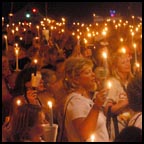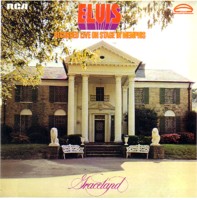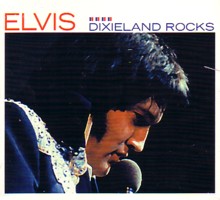Elvis
fans: "The Following"
(another
article in EIN's series of trying to undertand the question..."Why
Elvis?")
|
Many
words have been written over the years to describe Elvis'
fans. Often they are steteotyped as being lower class
women in rural areas. But how true is this broad assumption?
Do Elvis fans conform to a general socioeconomic type
that allows them to be 'profiled'? And what are Elvis'
fans as a "group"?
Patsy
Hammontree from the University of Tennessee conducted
a study of Elvis' fan base and commented in Audience
Amplitude: The Cultural Phenomenon of Elvis Presley
(published in Elvis Images and Fancies - Jac
L. Tharpe editor):
"There
is a general misconception that only undereducated women
on a lower socioeconomic level constitute the Elvis
Presley audience. Rather, his audience is comprised
of an incredibly variegated group of people from all
economic and social levels.
|
 |
Chronologically,
the spectrum stretches from age five to eighty-five. And large
numbers of men - including construction workers and physicians
- admire Elvis. It is virtually inpossible to draw a 'profile'
of the Elvis Presley fan because of such diversity, a factor
which also precludes any standardized label being applicable
to the mass audience. Elvis' popularity was international. He
had millions of followers in both Europe and Asia. There are
Presley fan clubseven in the Middle East. Someone said boys
and girls were wearing Elvis Presley T-shirts in the jungles
of Thailand. The diversity of even a sampling attests to the
Presley cultural phenomenon. In truth, the man takes on mythic
and archetypal dimensions such that for some fans only Christ
is greater."
Professor
Hammontree's observations are more than credible. Elvis fans
include your next-door neighbor, dentists, doctors, truck
drivers, many politicians - consider the Japanese Prime Minister,
Junichiro Koizumi and former US president, Bill Clinton -
and royalty - England's Princess Anne, and the King and Queen
of Thailand who visited Elvis on one of his movie sets.
Hammontree
goes on to comment:
"The
Elvis following is often inappropriately referred to as a
cult. Concisely speaking, a cult is a group comprised of disaffected
persons unified in their values who look to a leader for guidance
or remain nostalgically attached to a lost leader...But Elvis
Presley neither proselytized nor persuaded, and there is considerable
variety in the social and moral values of his followers. In
fact, it is not easy to find an appropriate label for these
millions who express degrees of interest in Elvis...He gave
meaning to their lives in numerous ways, no matter what ages
they were. They form a group so vast, diverse and dedicated
that no concept has the magnitude to encompass them."
| The
"Elvis as cult" concept has been written about
for many years. While theoretically, Professor Hammontree
is correct in her analysis, EIN would argue that
perhaps the definition of "cult" needs to be
re-examined in the light of strong psychological drivers
which shape "how" many Elvis "followers"
internally view his impact on them. The elements of "guidance",
"nostalgia", "unified in values" and
"implied guidance" may be taking on new meaning
as they relate to and function around Elvis Presley and
his fans. |
 |
The
diversity of Elvis fans is a fact that most media outlets
fail to grasp. Rather they pigeonhole and stereotype fans
based on an unusual or extreme few.
Patsy
Hammontree identified an interesting point in her study, that
of Elvis' impact on children. She said:
"One
striking aspect of the Presley phenomenon is the attraction
he held for children...Surprizingly, many of these youngsters
did not inherit a predisposition to Elvis devotion from their
parents. Some were spontaneous in their intense feeling for
him - much to the bewilderment of their parents."
As
one example of Professor Hammontree's finding, L. Christine
Hayes commented in her book, Magii from the Blue Star,
about the seven year-old boy who, when asked in 1984 by CNN
Cable News who is hero was, replied, "Elvis Pwesley."
When asked why, the boy said, "Because Elvis is an angel
and is going to take care of the world." Neither of the
boys parents were Elvis fans.
Another
example. One little four year-old boy, looking at Elvis thru
binoculars at a concert said to his father, "Daddy, Elvis
is singing just for me...he is looking right at me!"
Consider
also the similarity of incidents observed at Elvis concerts
with incidents at religious events. Eric Culver, classical
trombonist and studio musician occasionally toured with Elvis.
He observed fans' behavior and commented that the most appalling
aspects of the concerts was seeing parents, mothers and fathers
alike, hoist frightened children into the air at the front
of the stage - urging them to reach out for the scarves Elvis
was giving away.
I
particularly liked this passage in Professor Hammontree's
paper. It concerned the frustrations of a non-Elvis fan (the
husband), married to a fanatical Elvis fan:
"Preceding
a concert in 1975, the man's wife received eleven phone calls
in the course of one afternoon, all from the same woman who
was passing on each fragment of information regarding Elvis'
plans for the particular concert tour. As the family sat down
to dinner the phone rang again. The husband looked at hios
wife and said, 'That will be Christine. Elvis has probably
farted and she wants to you to know about it while the scent
is still in the air.' "
Perhaps
Professor
Hammontree was right when she closed her dissertation by saying:
"The
universality of his appeal means he somehow provided a transcendant
figure for millions of people. is was an archetypal appeal
to the collective unconscious. Fans cannot say specifically
what drew them to him. They simply know that they were powerfully
attracted, and knowing it is adequate for most of them. The
result is both a worldwide community and a worldwide communion."
(Spotlight/Article,
Source: Patesy Hammontree in Elvis Images and Fancies, edited
by Jac L. Tharpe/EIN)
Click
to read: Elvis - Sightings &
Faith: Making Sense of the Seemingly Absurd
|







